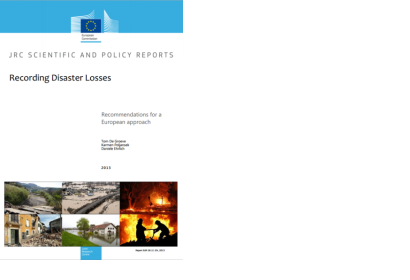A new comprehensive study, published by the European Commission Joint Research Centre (JRC), outlines the path towards a standardized European approach to systematically record and manage disaster loss databases.
The document “Recording Disaster Losses: Recommendations for the European Approach” outlines the best strategies to fulfill the European Union's plan for a common disaster losses database for risk assessment and disaster management. “Risk assessment requires accurate recording of previous disasters and in particular the associated losses in terms of human casualties, property and environment damage as well as economic loss,” the report says.
The study recommends a three-fold strategy – disaster loss accounting, disaster forensics and risk modeling. An account of disaster losses could serve as statistical and reference point for local, national and international DRR programs. Forensics information will help strengthen prevention activities, but also contribute to mitigation and response. And data of losses would help calibrate risk assessment and forecast models.
The study included an assessment of global databases for disaster losses and made recommendations on the integration of the European data approach in the global system.

